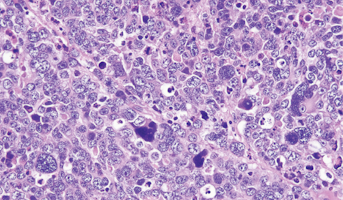Oncolytic Virus to Potentiate Immune-checkpoint Blockade in Immunologically Cold Pediatric Brain Tumors
Email Principal Investigator

Aaron Diaz
CBTN Specimen
CBTN Participants
CBTN Samples
Backer
DoD Translational Team Science Award
About this
Project
Some common viruses (e.g. measles, poliovirus) preferentially infect and kill tumor cells. This fact was discovered at the beginning of the 20th century. However, it was not until recently that this approach was recognized as an immunotherapy. It has been shown that viruses have the ability to stimulate an immune response in solid tumors with an otherwise inactive or “cold” immune system. This method is referred to as the use of oncolytic virus. The project will explore the use of oncolytic viruses through the analysis of tumor biopsies. This project is partially based on specimens from an ongoing clinical trial (NCT02962167) for measles virus in pediatric medulloblastoma. The Children’s Brain Tumor Network has carefully archived these tissues and this work is only possible as a result of those efforts. The ongoing Phase I trial supports the strategy of combination therapy and the use of oncolytic viruses in this combination. Thus, therapy combinations developed in this project will form the basis of an expansion of this trial and better outcomes for medulloblastoma patients as a result.
Ask The
Scientists
What are the goals of this project?
Researchers will explore the use of oncolytic virus as a combination therapy for the treatment of pediatric medulloblastoma.
What is the impact of this project?
The results from this project will form the basis of an expansion of clinical trials in this space, leading to faster development of therapies.
Why is the CBTN request important to this project?
This project would not be possible without the provision of specific specimens that have been carefully catalogued by the Children’s Brain Tumor Network.
Project
Results
In year one of the project period we have made significant advances in the acquisition of clinical specimens, the multi-omics profiling of clinical specimens, and bioinformatics analysis of the resulting data. We have completed the projected prospective collections of blood and CSF from the clinical trial NCT02962167 and met our project’s targets. All archival tumor, blood and CSF specimens from the PNOC trial have been transferred to the Diaz lab. We have made significant progress in our analysis of our archival specimens. We have subjected the frozen tumor specimens to single-nucleus RNA-sequencing (snRNA-seq) and most blood specimens to bulk RNA-seq. We have completed the bioinformatics pre-processing of the snRNA-seq/RNA-seq data. This included: quality control of sequenced reads, alignment and gene quantification, filtering of low-quality/doublet capture events, calling somatic mutations and filtering neoplastic cells based on those results, clustering, and cell-type classification for non-neoplastic cells.
Specimen Data
The Children's Brain Tumor Network contributed to this project by providing flash frozen tissue.
Meet The
Team
Aaron Diaz, PhD - PI
Sabine Mueller, MD, PhD – Co-PI/clinical
Noriyuki Kasahara – Co-PI/mouse studies
Husam Babikir, PhD – Postdoc performing ‘omics assays
Karin Shamardani – Research Associate performing ‘omics assays
Lin Wang, PhD – Postdoc performing bioinformatics analysis
Francisca Catalan – Research Associate performing bioinformatics analsyis




